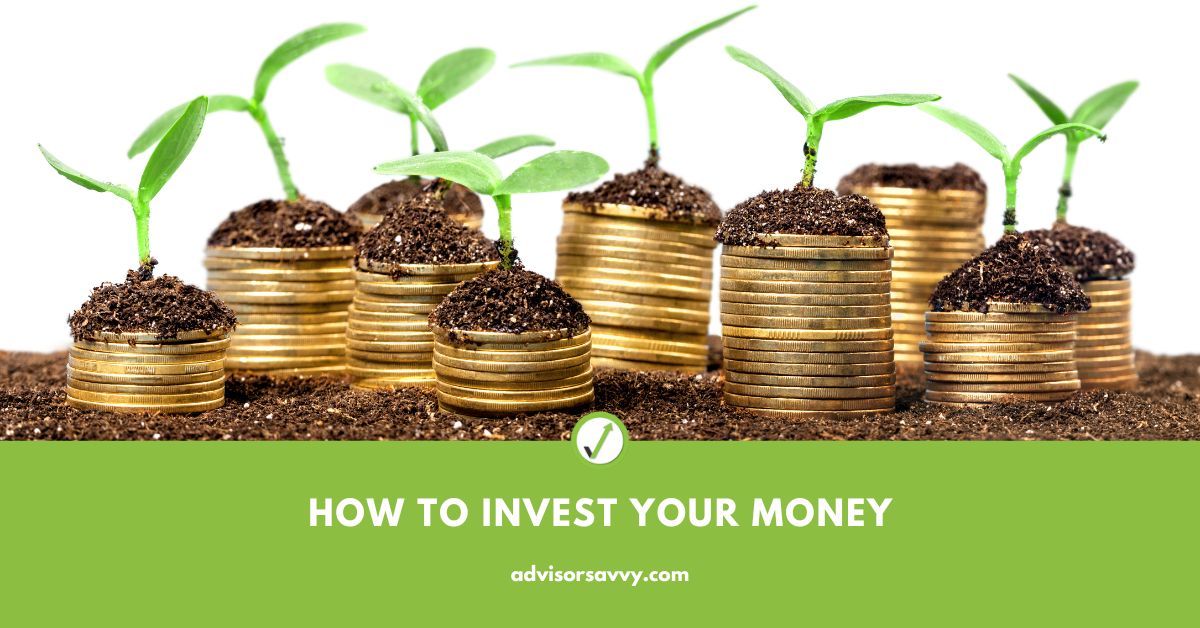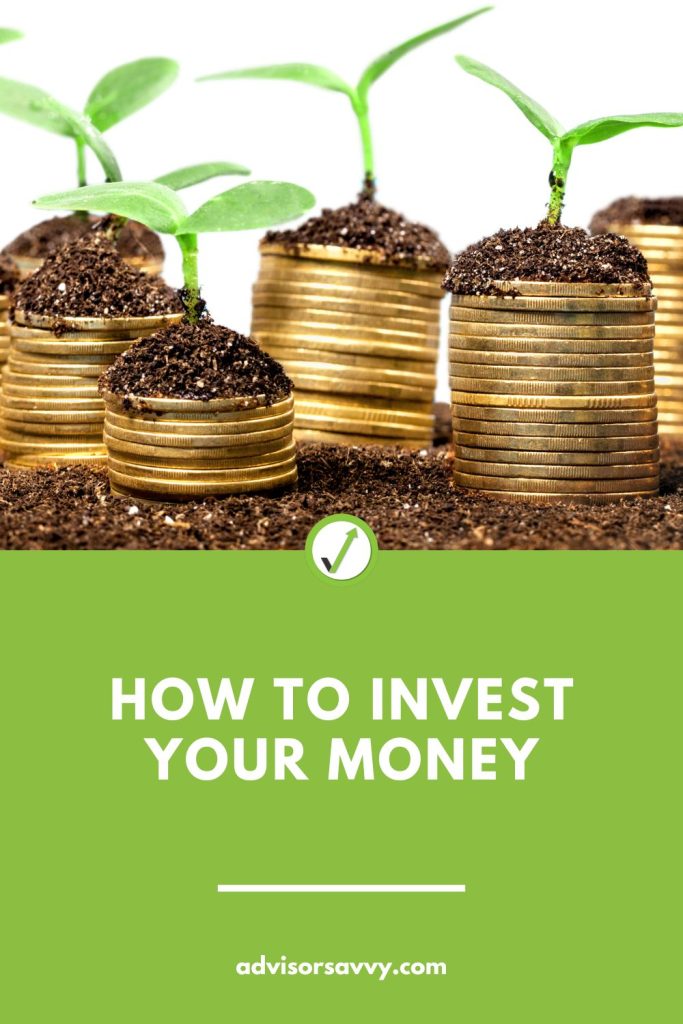
Any financial advisor will encourage you to invest to grow your money. It sounds simple enough, but it’s important to understand how you can benefit from investing. Ready to learn how to invest your money? Keep reading to learn some tips and tricks!

Table of contents
Why invest your money?
When most of us think about the value of investing, we think about making money. But there are more reasons to invest than just earning.
Shelter your income
Some investment vehicles are tax shelters, meaning the money you invest is deducted from your taxable income and thus, untaxed. These investments help you keep more money in your pocket. The more you can take advantage of tax-sheltered opportunities, the more money you have to invest and grow. Investing your money this way is a double bonus. It reduces your current taxable income, lowers your taxes each year, and allows you to save more.
Financial planning
Setting financial objectives with your advisor is the key to making sure the money you invest is working towards your goals. By investing your money, you’re able to meet those goals faster by earning off of your investments.
Make money off of your money
Whether or not the money you invest is tax-sheltered, wisely invested and managed funds will see a growth in returns. Your investment style will determine how much growth you might see over a particular period of time. If you’re saving for a trip in three years, you won’t want to chance losing that money on a higher-risk investment, whereas if you’re saving for retirement, you might be willing to take on more risk for a greater return.
The best ways to invest money in Canada
There seem to be a lot of options out there, but deciding where to allocate funds is not exactly intuitive. The best places for you to invest your money will change in any given year. That said, there are some fairly reliable places that should give you returns and security. So when you ask yourself, ‘where should I invest my money?’ there are some good general rules to follow.
How to invest
There are multiple ways to invest your money. In some instances, you choose instruments, such as Mutual Funds and ETFs in which to invest. There are also bank accounts that exist for the purpose of investment.
Mutual funds
While mutual funds may be seen as risky, they are still lower risk than other options, and do tend to allow greater returns. Mutual funds are run by a money manager who pools investments from multiple investors, in order to diversify the investments. Diversifying helps insulate the total investment from market fluctuations that can affect one particular sector.
Exchange Traded Funds (ETFs)
ETFs are traded similarly to a stock, except instead of a particular company, an ETF is a collection of securities that are traded on the stock market. An ETF can contain different types of investments, including bonds and commodities.
Related Reading: ETFs vs Mutual Funds: Which is Better?
Tax-Free Savings Account (TFSA)
More and more Canadians are taking advantage of the ability to invest their money in a TFSA. The benefit of the TFSA is its accessibility, and the fact you can take the money out without tax implications. The funds invested aren’t deducted from your income to allow for an income tax deduction, but the earnings off of your investments are tax-free.
Registered Retirement Savings Plan (RRSP)
If you’re saving for retirement, the RRSP is one of the best investment tools. It provides a tax shelter for your investments, reducing your taxable income by the amount you’ve invested. Any money withdrawn from your RRSP is considered income and is taxed as such. You also lose that contribution room forever, so it’s best to avoid early withdrawals if possible.
Related Reading: TFSA vs RRSP: Where To Put Your Money
Stocks
While the cost of individual stocks vary on a day-to-day basis, the stock market does increase in value over time. That’s what makes investing a wise choice for long-term gain. Choosing to invest in stable companies will go a long way in multiplying your money over time.
Bonds
Often considered a more stable investment than stocks, bonds are a great investment choice if you want a more guaranteed return on your investment. With a bond, you ostensibly lend money to an issuer and they pay you back with interest after a specific term has passed.
GICs
A Guaranteed Investment Certificate is another investment tool that is relatively safe and secure. It works like a savings account, insofar as you deposit money into the GIC and it will earn interest based on how much is invested. The difference with a GIC is that the money is tied up for a certain amount of time and can’t be withdrawn. They are also similar to bonds, as you are lending money to the issuer and they are paying you interest on that loan. The greater the investment, the greater the ultimate return.
Real estate
Investing in real estate is a great investment option if you can get into the market and purchase in a relatively stable area. Real estate can be precarious, but in the right market (and there are MANY hot markets across this country right now), getting into real estate as an investment tool will pay off in dividends long-term.
Bitcoin or Cryptocurrency
Bitcoin is a digital currency, also referred to as cryptocurrency. There is no central bank but the currency holds value and is affected by market fluctuations. At its most simple, people buy bitcoins and trade them among themselves. Because it’s still a relatively new investment tool, it’s considered more volatile and thus, less reliable for solid returns. That said, if it manages to find some stability, its value and worth could level out and increase.
Costs and fees
Investing isn’t free. There are costs associated with investing in mutual funds, called MER, or the Management Expense Ratio. An MER is made up of the total cost of management fees, operating expenses and taxes that are charged to the fund and expressed as a percentage of the total value of the portfolio.
Related Reading: Investment Management Fees: A Complete Guide
Where to invest money
The ability to do your own investing has been a growing trend in Canada. Discount brokerages have become increasingly popular. Some people choose to go it alone while others enlist the help of financial advisors who can guide them with their expertise.
Discount brokerage
Canada has a wealth of highly respected online brokerages that can help you invest your money. An online, or discount brokerage, is appealing to a wide range of investors because the fees for trading are quite low.
An online broker allows you to build an account and use that account to invest in high- or low-risk investments, depending on your own personal preference and risk tolerance. This type of investing is all DIY, which is great if you have a solid grasp on what you’re doing, or you’re investing in lower-risk options. You can most certainly pick higher-risk stocks, but you may not want to DIY unless you have a solid understanding of the market,
Examples of discount brokerages include Questrade, Qtrade, TD Direct Investing and Scotia iTrade.
Robo advisor
A robo advisor is a newer, automated investment technology. It is a great tool for a newer investor, or someone who wants to be more hands-off with managing their investment portfolios. Robo advisors are a lower cost-option, but nonetheless an intelligent tool that takes the guess-work and stress out of managing investments. With a robo advisor, you input your investment style and preferences and a portfolio is automatically built for you. The software then regularly and automatically updates and calibrates your portfolio to adjust it to be the most lucrative for the investor.
Investment advisor
The role of an investment advisor is to help make recommendations on quality investments, and to analyze securities, such as mutual funds, stocks and bonds. Typically, investment advisors are fee-based and work with you to build a portfolio of investments that are best-suited to your long-term and short-term financial goals.
Financial advisor
A financial advisor is there to give you advice on how to manage your money. They should be well-versed in the market and give advice on what savings, investment and insurance tools you need. While they can make investment recommendations, they are less specialized in investments than an investment advisor.
Should you invest money?
There is no one right answer when it comes to investing. Whether or not you want to be heavily involved in managing your own investments, the key is to make sure your investment strategy is designed to meet your personal goals.
How do I start investing money?
Okay, so you understand the value of investing now, and you want to start to make some money. Now comes the big hurdle of how to actually make money. Thankfully, it’s not that difficult to get your feet wet in the world of investment.
Easy ways to start investing
Here are some quick ways to begin your investing journey. If you’re really uncertain of how to proceed, consider consulting with a financial advisor.
Start now
It’s never too late to start investing, and it’s also never too early. The longer you have to invest your money, the more opportunity you have to see it grow.
Gauge your risk tolerance
It’s important to know how much money you’re willing to invest and how much you’re willing to lose. The greater the investment, the greater the risk, but also, the greater the possible return. Decide upfront how to invest in stocks with very little money, if you want to start small.
Understand your options
There are so many different investment products on the market, it’s important to explore the options that exist and what makes the most sense for you. Talking to a professional is always helpful, but there are online alternatives that give new investors easy-to-understand breakdowns of what investment options exist.
Consult a professional
Yes, you can and should do your own research, but there is no replacement for solid, educated advice. Choosing an investment strategy that is right for your individual needs is best done with someone who knows the markets. Go in with some knowledge and questions but let them use their expertise to guide you towards the best investment strategy for you.
Read More: How to Invest $1,000, $10,000 or $100,000
